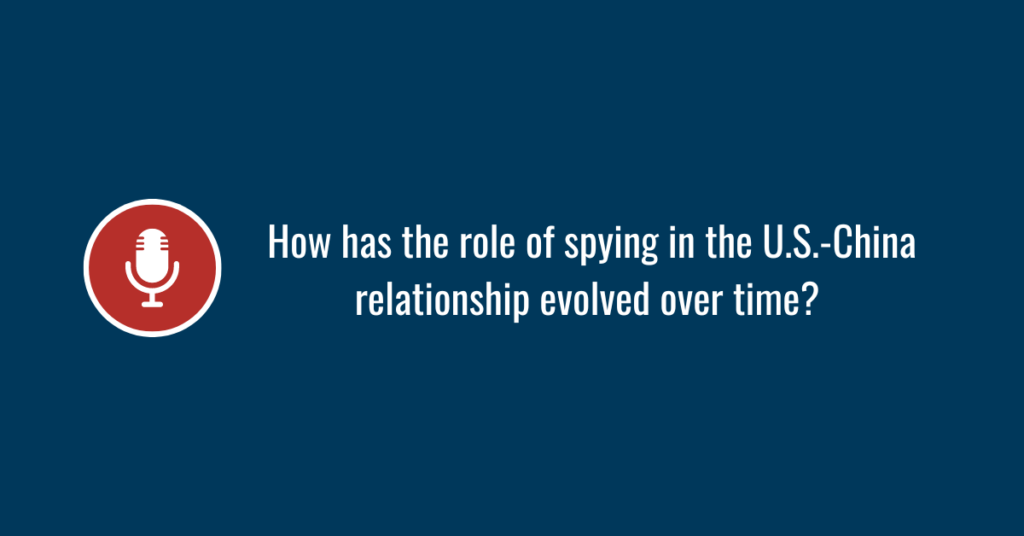Ever since a balloon flew from China over the United States in February, concerns about surveillance have been at the forefront of U.S.-China relations. But the two countries have a long history of spying on each other. In this short explainer, John Delury contextualizes the current tensions and assesses just how worried Americans should be about Chinese espionage.
Listen to more U.S.-China Insights podcasts
Transcript
How has the role of spying in the U.S.-China relationship evolved over time?
John Delury: So this question of spying between the United States and China obviously has gotten a lot of attention recently. And it turns out it has a very long tail when you look back at the history of intelligence and espionage, and in particular for the whole first period of U.S.-China relations from 1949, when the PRC is established, all the way up until finally Richard Nixon’s visit in 1972.
I mean, that first period is almost defined by the covert relationship, including a lot of spying, mostly America spying on China, simply because the two governments don’t acknowledge one another. So, it’s almost, by definition, sort of a covert relationship. And I explored a lot of that in my book.
If we jump to the next period after 1972, there’s this incredible reversal where actually, you know, especially you look at the 1970s and through the 1980s, there’s quite a bit of intelligence sharing. Henry Kissinger really uses intelligence sharing, and he’s reciprocated by Zhou Enlai as a way to quickly create trust between the two countries. So there’s a dramatic 180 degree reversal of the dynamics.
I think if we look at the more recent period, everything’s gotten a lot of a lot more complicated. And I do think we’ve sort of reverted back to something a little bit closer to the early days in terms of now both sides spying on one another and worrying about the espionage. So, it’s something that’s probably a little bit understudied, but a very important part of the history between the United States and China.
What does the balloon incident mean in the broader context of U.S.-China relations?
John Delury: You know, it was fascinating to watch the American public be transfixed by this balloon, and it’s literally the bright, shiny object that’s hard to ignore, and one can certainly understand why there were so much public fascination fueled, I think, by a lot of media coverage.
I’m not sure, actually if the if the spy balloon is significant in terms of intelligence gathering. And actually, according to the U.S. government, the balloon wasn’t adding much in terms of what China can see with its satellite espionage capabilities.
So I think that the balloon and its significance and over time, I think the way that we’ll look back upon it, is it’s more about public attitudes in the United States and just the way in which the American public has become so much more concerned with what China is up to in the world and even feeling sort of watched and obviously bristling against that, maybe to excess in this particular case. So I think it’s the public reaction that’s going to be the most significant part of the whole spy balloon episode in U.S.-China relations.
How concerned should Americans be about Chinese espionage?
John Delury: You know, I don’t think Americans need to stay up late at night worrying about balloons. I think there was a little bit of an overreaction to that particular form, almost old school form of espionage.
And a lot of intelligence, I think publics and in particular democratic societies like the United States, they need to be careful not to overreact. You know, there’s an understandable tendency to get too worried about spying. At the end of the day, actually, countries need to know about one another. And there’s a certain amount of intelligence gathering, so long as it’s not hurting anyone, that all countries are involved in, and it’s not necessarily destabilizing. So you need to know where sort of the lines are.
And then, of course, you need relationships among the governments when there’s a feeling that the other side has really crossed the line, that there are mechanisms to enforce limits on how far it goes. So I think that it’s right that Americans are concerned about this and bringing it more into the public conversation, but we also need to modulate some of those concerns and be careful not to overreact.
So, it’s kind of the Goldilocks principle. You have to find that golden mean where you are recognizing that dynamics are changing and that Americans do need to be concerned about this, but not to the point of overreaction.

